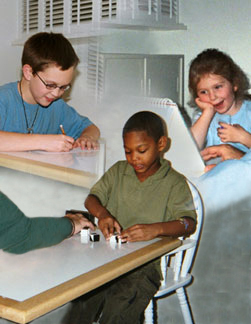by C. Suzanne Schneider, Ph.D.
Many forces affect children’s ability to learn and achieve:
- their genetic endowment;
- the influence their parents exert;
- the quality of their schools;
- the training and motivation of their teachers;
- the values held by their peers and others;
- their socioeconomic status;
- their racial, cultural, and sex-role identities;
- and their social experiences.
All of these forces exert important influences that help to determine whether children achieve academically and later find meaningful, satisfying and self-sustaining work.
The following suggestions may assist you in providing positive role models; setting goals, limits and expectations; helping children prepare for learning; enhancing their motivation and giving them feedback about their performance; parenting gifted children and avoiding parenting pitfalls. With children who are underachieving, you may need to employ pattern specific remedial strategies included in Overcoming Underachievement, BULLETIN of the Pennsylvania Association for Gifted Education (Schneider, 1998), which is included in the Publications section of this website.


Ideal conditions for fostering achievement are seldom present. Effective parenting takes patience, practice, and perseverance. If one thing doesn’t work, try something else. The following suggestions may help you foster your child’s achievement, but there is no substitute for expert professional assistance when your child’s needs exceed your own resources.
Back to topics
Providing Positive Role Models

- Serve as a role model for your children’s achievement by consistently demonstrating the values and behaviors you want your children to display and by providing them with other achieving role models and mentors to emulate. Don’t wait for your children’s schools to do this.
- Model and talk about pro-social values such as honesty and integrity, kindness and compassion, respect and consideration for self and others, cooperation and compromise, and personal and social responsibility.
- Show mutual respect for your child’s other parent(s), and emphasize his/her/their positive achieving values. If there are differences of opinion about parenting issues between or among you, discuss them when your child is not present. Avoid setting another parent up in an ogre or bad-guy role or as a dummy.
- Use effective communication skills, and teach your children to express their feelings, thoughts, and needs in self-assertive ways that are age-appropriate and socially acceptable.
- Demonstrate your interest in and commitment to the work you have chosen for yourself. Take your children to see your workplace, if possible, and describe and demonstrate what you do.

- Begin your own day with a plan of action to help you get things done in a timely fashion. Discipline yourself and implement your plan without wasting precious time and energy. Show your children how you do this.
- Emphasize the connection between your own efforts and outcomes. When you succeed, show your children how to savor success. Let them know that you may at times have doubts, and you sometimes fail, but you use your failures and mistakes as learning experiences and survive to succeed again.

- Model a love of reading by reading for your own pleasure, as well as for information and education. Take your children with you on your visits to libraries and bookstores.

- Serve as a model of life-long learning, exploration, and investigation. Your own level of education will convey an important message about the value you place on education. Children are more likely to achieve academically and pursue challenging occupations that provide them with dignity and economic security when their parents are college educated than when their parents are high school dropouts.

- Take time to travel with your children before they become more interested in being with their peers and have their own plans, which may not include you. Talk with your children about worldwide issues and events.
Setting Goals, Limits and Expectations
- State your beliefs and expectations concerning values, behaviors, responsibilities and schoolwork briefly and simply, and make sure that what you say is clearly understood.
- Consistently convey the expectation that your able children will continue to pursue their education beyond high school.
- Have your children individually tested for strengths and weaknesses, as well as for appropriate instructional levels, to help you set realistic expectations for their achievement.
The comprehensive evaluation process recommended and used by the psychologists associated with the Center for the Gifted is described in the article Testing Gifted Children, which is included in the Publications section of this website. Such evaluations are designed to assess children’s levels of ability; their achievement and motivation; their social-emotional functioning; and their creativity through the use of objective, subjective, and projective procedures.


Testing procedures should include:
- individually administered measures of intelligence;
- comprehensive academic placement testing;
- projective psychological assessment;
- gross neurological screening;
- parent and teacher input forms and behavioral assessments;
- behavioral observations and clinical interviews;
- assessment of creative portfolios, as needed;
- vocational interest testing (for teens and adults), as needed;
Comprehensive Evaluation Reports should include information concerning children’s strengths and weaknesses and also let parents and teachers know whether the child being tested is achieving in accord with his or her potential. In addition, the testing results provide a basis for the development of individualized recommendations needed to structure home and school environments that are optimally beneficial for each child.
If your child has an emotional, physical or learning disability, make sure the professional who evaluates him or her has experience in modifying the testing procedures and interpreting the results in accord with your child’s special needs.

- Help your children become aware of their own strengths, learning styles and preferences so that they can seek out what they need to learn in ways that are most effective for them.


- With young children, join your child’s teachers and counselors in establishing clear, positive and realistic expectations for your child’s achievement. With older children, help them set specific, positive and realistic goals to help them measure their own progress. Goals should be high enough to challenge them, interesting enough to motivate them, and realistic enough to be attainable with a reasonable amount of effort.
- Make sure that as a parent you are in charge without taking over. Let your children know that some rules are negotiable while others are not and that nothing they say or desire can absolve you of your responsibilities as a parent.
- Do not treat young children like adults, no matter how smart they are. The persistent blurring of generational boundaries and reversal of parent/child roles deprives children of the safety and security of knowing that you are in charge. It also fails to let them know where they stand and how to act with other adults in the world at large.
- Try to frame your responses to your children’s inappropriate, intrusive, inconvenient and annoying questions, demands and limit-testing in a calm and positive manner. For example, you might say, “I can see that you would really like to do that, and we can do it as soon as you finish your homework and I finish what I am doing.”
- Provide children with constructive criticism in ways that do not shame or embarrass them, and do it privately. Precede and follow each constructive suggestion with positive and encouraging comments.


- Calmly, quickly and consistently enforce clearly stated consequences for misbehavior and noncompliance, with firmness and without anger, until the required tasks are completed or the misbehavior has stopped. The lack of such parental action, like intermittent reinforcement, makes undesirable behaviors very resistant to change. Consistency in this context means that parents should be in agreement concerning family rules and expectations and should enforce previously stated consequences in accord with the circumstances and their individual parenting styles.
- Focus on the choices children have made, consciously, unconsciously or by default, when implementing consequences to help them see the outcomes they experience as the result of their own actions rather than as punishment.
- Rely on natural consequences as much as possible. Otherwise, use time-out periods, removal of privileges and restitution rather than punishment as consequences for misbehavior. Consequences should be brief and should last no longer than necessary, since children’s sense of time is different from that of adults. A general rule of thumb for using time-out periods with young children is that they should last no longer than one or two minutes for each year of the child’s life. Otherwise, children may give up in despair or rebel. Time-out periods should be spent in a boring place with no interesting distractions.
- Empathize with children’s feelings of disappointment when their choices and actions result in consequences that are not to their liking, and point out that tomorrow they will have new opportunities to make different choices with better consequences.
- Limit the amount of time your child spends watching TV, playing video games and engaging in other passive forms of activity and entertainment. One rule of thumb is to allow no more than one half to one hour of TV per day, other than for time spent watching school related programs.
Preparing for Learning

- Provide your child with an organized environment with consistent limits and daily routines. Children need structure, with flexibility, to feel safe and secure enough to take creative risks, explore who they are, what will give meaning and purpose to their lives, and how they relate to other people. Consistent limits and routines also help children learn how to discipline themselves, structure their lives, and apply themselves and their abilities to the tasks required of them. If your home does not provide such an environment, establish and implement a family program of getting organized, setting goals and priorities, doing first things first, and spending time on what really matters.
- Encourage children to prepare their own school bags and clothes before going to bed in order to help them get organized and reduce morning stress. Using checklists may help them get organized and remember what they need to take to school.
- Establish a special place near the door of your house where school bags and books may be stored temporarily to avoid littering shared spaces.
- Soon after children have learned how to tell time, have them set their own alarm clocks and be responsible for getting themselves up and dressed in the morning. If they don’t get up, require them to be accountable for their own lateness or absence from school. If patterns of dawdling or defiance of morning routines make them late for school, state this in your note to the teachers. If these children miss the bus and their age and circumstances make it impossible for them to walk to school, you could have them pay you taxi fare out of their allowances for driving them to school. However, if they stay home, have them remain in their rooms all day with no TV or computer games.

- Then, have them set their alarms one half hour earlier each morning after the day they were late until they discover how much time they need to function independently in the morning. As an incentive to encourage children to get themselves ready early each morning, you might allow them to watch TV after breakfast until it is time for them to leave for school.

- Assign your children regular home chores that are appropriate for their age and ability beginning at about age 3. This will help them develop responsibility as members of a family unit. Chores can be changed or exchanged from time to time but must be done in addition to school homework and play time.
- Avoid doing for your children those things that they can do and should be doing for themselves and giving them things they should be earning through their own efforts. When children struggle and solve problems successfully, and when they discover and earn things for themselves, their self-confidence and self-reliance increase.

- Stay involved in your children’s school and communicate regularly with their teachers about their progress. Participate actively in scheduled parent conferences, and initiate such conferences if necessary. This applies to fathers as well as mothers. Parents’ involvement in their children’s schools has consistently shown a significant positive association with children’s achievement.
- Teach your children to set realistic goals, establish priorities and focus their efforts based on how much work needs to be done and when the work is due.
- Help children learn how to break large projects into smaller, more manageable components and set deadlines for completing each component.

- Allot 10 to 15 minutes of homework per grade level, beginning in the second half of first grade and continuing through middle school. College bound high school students should spend an average of two hours per night on homework. This time should be used for reading, studying, research, etc., even if no homework has been assigned. Set an upper limit on homework time except for major projects and test preparation. College students are expected to do at least two hours of outside study and preparation for each hour they spend in class.
- Establish a regular schedule for when homework should be done each night. Before dinner works well but may not be possible if parents are not there to monitor. Right after dinner may be necessary, but just before bedtime should be avoided because it often encourages children to dawdle and push bedtime limits.

- Help your child establish a regular homework routine in a well-organized and quiet place, free of family traffic, activities and other distractions, a place where she/he can study independently at a desk or table and where adults can monitor to make sure that the required homework is being done. There should be no TV, video games, or loud music playing.


- When an adult in the family also has “homework” to do, a supervised study hall or computer room arrangement may also sometimes be effective, as long as the children are able to study there independently and quietly.
- Some research suggests that when children are continually exposed to uncontrollable environmental noise, they learn to screen out not only the noise but also what parents and teachers are saying to them. Such noise also contributes to people’s stress levels and can result in hearing losses. However, some kinds of rhythmical music appear to be highly conducive to learning, relaxing and removing mental blocks.
- These include classical music, especially from the Baroque period, and some ancient Indian and Japanese music, as well as a few others to a lesser degree–not rap, rock, hip hop, country, heavy metal and others, which interfere with learning. Once children have learned to concentrate in a quiet atmosphere, you might let them experiment with introducing quiet music as long as the sound does not interfere with their concentration.
- Refuse children’s requests that you do their homework with or for them. Instead, express confidence in their abilities and suggest that they persevere and review things several times before they ask you for help. Do agree to quiz your children about what they have learned prior to tests if they ask you to. Teachers sometimes assign homework projects designed to get parents actively involved in their children’s education. If this poses problems for you and you are unable to participate, or if this happens so often that your child feels dependent on you and unable to succeed without your assistance, discuss the situation with his or her teacher and emphasize the need for your child to become more self-reliant.

- Make sure that your children remain responsible and accountable for completing their required homework legibly and completely. Checking assignments for accuracy and quality is the teacher’s responsibility. Both parents can monitor children’s homework. However, it appears to be especially important for boys’ fathers to bear the major responsibility for setting expectations and monitoring their sons’ homework. If a father has to be absent in the evening, he can say he will be checking regularly with the boy’s mother to make sure that the required work is being done.
- Provide your child with the materials he or she needs to study effectively. These include a large homework assignment book; notebooks; a monthly calendar to keep track of assignments and activities; a backpack or school bag; plenty of paper, pencils, pens, a ruler, tape and glue; a dictionary and encyclopedias; etc.

- Get your child a computer and all the software she/he can handle and you can afford.
- Teach your children study and research skills. If you are not familiar with these skills yourself, find someone else who can teach your children how to learn efficiently and effectively through independent effort.


- Children generally need to practice what they learn in music lessons five or six days a week. Total practice time per day is usually equal to the length of the weekly lesson, unless the music teacher recommends otherwise.
- The total daily practice time may be divided into 10- or 15-minute segments and integrated into the child’s regular routine, e.g., before brushing teeth, before homework sessions, before or after dinner, etc.
- Make sure you and your children eat balanced, nutritious meals at regular times, sitting down at a table talking as a family, with no TV. A good breakfast is very important for effective functioning. Allow enough time for children to use the toilet without feeling rushed before they leave home in the morning; they may be too busy or feel too embarrassed to ask permission to use the bathroom at school. This can cause health problems and interfere with their ability to concentrate on learning. Make sure your child also gets enough sleep, fresh air, and exercise to stay fit and healthy.
Enhancing Motivation & Providing Feedback
- Show your child unconditional love and appreciation, and make clear verbal distinctions between your feelings for him or her as a person and your feelings about his or her behavior, which, at times, you may not like or choose to tolerate, and they can change.

- Ask open-ended questions, and listen actively, respectfully, and reflectively as your children share their feelings, thoughts, ideas, experiences and dreams with you.
- Plan to spend some one-on-one time with your child each day, or in alternation with his or her other parent(s). Some children need more time and attention than others do, so you may not be able to treat them all equally.
- Validate your children’s competence and desirability as members of their own sex. This will help to increase their self-esteem and enable them to stand up to pressures that may encourage them to disown vital aspects of themselves and limit their achievement in order to gain social acceptance and approval. Children need to understand that popularity is something temporary and not of lasting value. Help them realize how many of the interesting and successful adults they know and admire were considered “nerds” in high school.


- Verbally reinforce efforts as well as accomplishments either directly or within a child’s hearing. Acknowledge even subtle signs of increasing responsibility, independence and self-discipline, as well as the timely completion of assigned tasks. Positive reinforcement usually encourages people to continue or repeat desired behaviors.
- Provide your children with socially acceptable and age-appropriate choices to help them develop an internal locus of control, gain greater self-confidence and self-reliance, resist peer pressures, and prevent possible future battles for control. Begin by allowing children to make simple decisions and then proceed to more complex choices and decisions.

- Give your children positive attention and moderate praise to increase their self-confidence and encourage their achievement. Highlight and reinforce evidence of their curiosity, responsibility, perseverance, and commitment to doing their own personal best.


- Help your children understand that while they have certain inalienable rights, privileges need to be earned through responsible behavior. Children need to understand that as they mature and consistently demonstrate good judgment and responsible behavior, their freedoms and privileges will increase. The parental message to be conveyed here is: “Privilege carries with it responsibility.”


- Encourage your children to compete with themselves and their own past performances rather than with other people. This will help to minimize the interfering effects competition can have on interpersonal relationships and creative risk-taking and lessen the fear of loss or failure. It may also help to avoid possible negative social sanctions for success and prevent able children from applying the performance standards they set for themselves to other people. Trying for fewer mistakes or using a timer may help children to improve their own performance. At the same time, children need to learn how to function effectively in competition with others. Group or team competitions can help with this and can also be used to teach good sportsmanship. Talent contests and academic competitions, such as science fairs and geography bees, can help children learn to compete comfortably as individuals and learn that winning and losing are only temporary.

- Teach your children to view mistakes and failures as opportunities for learning and creativity, instead of as reasons for depression, giving up, and developing negative self-talk and pessimistic expectations.


- Convey clear and consistent messages concerning the importance of academic achievement, and emphasize the intrinsic value of learning throughout life.
- Do everything you can to make sure your children’s schools are providing them with challenging work that is geared to their abilities and interests.
- Teach children how to brainstorm and use other creative strategies to make their “boring” schoolwork more interesting. Help them structure and focus their learning in accord with their own needs and interests, and teach them to study actively, so that they interact with the material in order to learn and remember instead of just passively reading and/or listening and then regurgitating what they have taken in.
- Be aware that boredom contains an element of anger and hostility. Helping children to identify and express what they are angry about can provide a basis for constructive action they can take to overcome whatever is bothering them.

- Help children become aware of and familiar with all the wonderful educational resources available to them. Teach them how to explore alternative approaches they can use to make their learning experiences more fun and interesting. For example, they could choose projects that involve their own personal interests and read ahead in the textbook so that they can ask interesting questions in class. They can also use computers and other technological aids to make the process of composing and illustrating stories and project papers easier and more fun.
- Help children see how their academic learning and achievements relate to their present and future lives outside of school. Help each child develop a positive vision for his or her future. Respect children’s dreams, no matter how unrealistic or inappropriate they may seem to you. Help children explore the steps they will need to take to make their dreams come true. They can then use this process as their dreams change with maturity.

- Encourage your children to keep a journal as well as a “happy list” of things they value about themselves and a portfolio of their own accomplishments. This can help to foster self-esteem and optimism and help to prevent or overcome discouragement and depression.


- Encourage your children to join social service groups and use their abilities for the benefit of others as well as themselves. This will help them appreciate the privileges they have. It will also let them see how good they feel when they give of themselves to others and realize that, even as children, they have important contributions to make. Such altruism will contribute to your children’s sense of self-worth and social responsibility as well as to their development of pro-social values.
- Make sure children do not confuse their rights to freedom and liberty with license to do whatever they like regardless of the impact their behavior may have on other people.



- Make reading a habit by reading to children as long as they continue to enjoy it and by permitting them to read to themselves in bed for half an hour each night before lights out. You might also encourage children to read to younger siblings.


- Help children recognize the importance of balance in life and the need to take brief breaks to rest, restore their energy, and think of new ideas and approaches. Children generally feel more motivated to do their homework if they have something planned to look forward to when their work is finished. Varying the work being done can help to sustain flagging attention. However, watching TV on homework breaks places children in a passive mode and may make it difficult for them to return to an active mode to continue their studies.
Parenting Gifted Children
- Read and learn all you can about the special needs of gifted children and the problems they commonly encounter.
- Bear in mind that people may be gifted or talented in different ways, which may not always be evident without adequate assessment. This is especially true for children with physical, emotional, and learning disabilities. These children may be excluded from gifted programs when testing procedures fail to take into account their disabilities and when the results are interpreted focusing on their disabilities and not their gifts. Psychoeducational assessments of young gifted children may also reveal some degree of developmental unevenness that is not symptomatic of disability. For example, relative developmental lags in fine motor control are not uncommon among young gifted boys, but such lags generally diminish and disappear with maturity.

- Be aware that creatively gifted children are often able to perform at higher levels than their IQ scores may suggest. Creative people tend to feel stifled by rigid structures and requirements. They may look disorganized, but they seem to prefer complexity and appear adept at organizing chaos. They also seem better able to tolerate ambiguity than others who are less creative, and they tend to play around with problems longer, without needing to rush to premature conclusions.

- Don’t assume that if your gifted child gets good grades he or she is achieving in accord with his or her potential. Gifted students are generally capable of performing at least one or two grade levels ahead of their age peers in their areas of talent, but they are seldom challenged to perform in accord with their true potentials. Without adequate identification and assessment, they are all too likely to languish unnoticed and underachieve in educational environments that fail to meet their special needs.
- Help gifted children understand and accept the true nature of their differences. Provide them with general information about their special abilities, not necessarily their IQ scores, and what it means to be gifted in comparison with others of average intelligence.


- Make special efforts to understand and validate creative children’s unusual ideas and perceptions. Creative thinking seems to involve a holistic-global, simultaneous, and Gestalt-like process, which is at times and to varying degrees intuitive or unconscious and at other times conscious. Often, the data creative people use to solve problems also seem to be different. Accept and validate creative children’s needs to think and do things their own way, even while you may also point out possible negative consequences they may not have considered.

- Teach creative children how to explain their unusual ideas to other people by modeling aloud a logical and organized, analytic and sequential, step-by-step deductive approach to problem solving (e.g., A, B, C, therefore D). Creative children may resist this knowledge, may find it frustrating, and may call it “boring,” but they need to learn how to do it in order to secure the understanding and support of other people. Less creative children also need to learn to use this process in order to become effective problem solvers. Global-simultaneous and linear-sequential problem-solving approaches are both necessary for the advancement of knowledge.
- Show gifted children how to use their daydreams as a rich source of material for their creative self-expression, and teach them how to express their needs and feelings in verbally assertive and socially appropriate ways.
- Be aware that, even when gifted children are able to expound at length about intellectual subjects or argue like well-paid, middle-aged lawyers, they are still children. Such children may need special emotional support from caring adults when they are able to perceive and understand disturbing things that they have not yet developed the emotional resources to deal with.


- Recognize that gifted children may learn to repress their feelings and intellectualize when they feel hurt or rejected; they can be very good at hiding their distress. In the absence of adequate academic challenges and opportunities for creative self-expression, they may resort to daydreaming and disruptive behavior to relieve their boredom. Because of these behaviors, and their typically high energy levels, they may be misdiagnosed as having attention deficit disorders. If someone at school says your child has an attention deficit disorder and should be placed on medication, have thorough medical and psychological evaluations done to determine whether the symptoms they are seeing are neurologically based or should be recognized as signs that your child is feeling bored by an inappropriate educational program that is stifling his or her inner press to know and grow.

- Provide gifted children with daily opportunities for creative self-expression to validate and help them develop their abilities, to facilitate their positive self-definition, and to avoid the frustration, oppositional behavior and depression that may result in the absence of such opportunities. Help creative children recognize how important regular opportunities for creative self-expression are to their own health and happiness.
- Teach children that creative peak experiences are generally followed by recuperative pauses that should be viewed as time to relax and recharge, rather than as cause for discouragement, self-doubt, and depression.


- Caution your gifted children against overgeneralizing in the emotional-social arena. While their tendency to generalize may help them learn in school, it may overextend the impact of emotional and social problems they experience and result in overly pessimistic expectations with respect to all other areas of their lives. Consequently, they may cut people off to avoid further hurt or rejection, and they may need to learn to give other people another chance.

- Help gifted children recognize the impact their extraordinary abilities and behavior may have on other people and learn how to cope with the negative social sanctions they may experience as a result of their gifted differences.
- Learning how to read other people’s nonverbal and other communicational cues can help them adapt and relate better socially, without trying to become more like other people in order to fit in and feel accepted.
- Teach your gifted children social networking skills at an early age. People tend to choose their closest friends from among others of similar intelligence, who may or may not be of the same age. Gifted children often need help finding other people with similar interests and abilities with whom they can form close friendships and resolve critical developmental tasks that are important for their emotional and social growth. Joining teams, clubs and organizations, as well as social groups for special activities and sleepovers, can help. Academic acceleration and/or transfer to a school with a greater number of gifted students can also help. If your child accelerates by subject or by grade, monitor carefully to see how well she/he adapts emotionally, socially, and academically to each change. Developmental counseling can help during the acceleration process.

- Serve as an advocate for your gifted child in your interactions with school personnel. If you have reason to believe (preferably based on documented evidence) that your gifted child is not being challenged in accord with his or her potential, be persistent, even if some people seem to think you are a “pushy parent.” You may need to be. Be careful not to let frustration force you into adopting an adversarial stance when your child’s special needs are not being met; your child may bear the brunt of your behavior. Instead, document your child’s needs through a comprehensive psychoeducational assessment conducted by a competent psychologist with experience in testing children with special needs. Then, share the results with school staff members, and enlist their cooperation in meeting your child’s needs to the extent required by law.


- Help your gifted children learn how to focus and set priorities when they seem confused or torn by the many options open to them because of their typically wide-ranging interests and abilities. Vocational interest testing can help teens begin to focus their efforts and consider career options outside their awareness and experience. Such testing can also help to broaden the outlook of gifted children who have narrowly focused their career interests prematurely to avoid feeling confused or to please other people. Children who intend to pursue careers in the creative and performing arts will probably need to develop other vocational skills in order to survive, and some gifted children prefer to do several things simultaneously to sustain their attention. What these simultaneous activities may be seems to depend on how each child is neurologically wired.
- Remember that apples don’t fall far from the tree. Explore what being the parent of a gifted child may suggest with respect to your own abilities and what being gifted means to you.
- Be aware that teachers who enjoy working with gifted students and are seen by such students as highly effective may well be gifted themselves and may need to deal with gifted issues in their professional work as well as in their personal lives.

Avoiding Parenting Pitfalls
- Be careful not to express your feelings about your children’s behavior as though you were speaking about them as people. This is one of the biggest and most frequent mistakes parents make. It is very important to distinguish between what children do and who they are. For example, you might say, “I love you and I’m not going to tolerate this (rude, irresponsible, etc.) behavior.”
- Don’t overreact to setbacks, give up on your children, or stop giving them what they need from you in order to achieve. The growth process usually involves taking three steps forward and then one or two steps back before going forward again. Teach your children to be persistent problem solvers by modeling such perseverance yourself.
- Be aware that your child will probably emulate any undesirable behaviors and patterns of communication you display, including perfectionism, disorganization, lack of appropriate emotional expressiveness, overly critical attitudes, power struggles, underachievement, and other forms of aggressive and passive-aggressive behaviors.

- Be careful not to lose control and lash out at your children in anger. Such overreactions may stem from your own unresolved issues. These might include failure to accept and deal with similar traits and behaviors in yourself or someone else in your past, or possibly, expectations that your children should fulfill your own dreams, needs and desires. The key to resolving such problems successfully lies in self-knowledge and self-acceptance. Try to remain calm, watch your tone of voice, be aware that sarcasm is a sign of repressed anger, and don’t lecture.
- Be aware that overly strict and unreasonable limits breed power struggles and rebellion, and power struggles appear to be a basic underlying cause of underachievement in children. The object here is to interact as a parent in an authoritative rather than authoritarian manner. Rigid structuring of limits and controls is usually a reaction to perceived threats to people’s sense of adequacy and security.
- Recognize that punishing children for misbehavior, instead of enforcing the consequences of their choices, encourages revenge fantasies as well as retaliatory behaviors, which may be expressed directly through rude remarks and aggressive rebellion or manifested indirectly through passive-aggressive behaviors, such as underachievement and “forgetting” responsibilities.
- Don’t hover, yell, nag or otherwise verbally remind your children of their assigned responsibilities. Instead, use notes and checklists that they can use to help them remember what they need to do.

- Don’t issue edicts and ultimatums, or threaten consequences over which you have no control or which you have to monitor closely to enforce. Remember that you can make choices concerning what consequences you have the ability, the time, and the willingness to enforce.
- Make sure that when you take charge as a parent, you do not take on your child’s responsibilities and problems as though they were your own. Doing for children those things that they can do and should be doing for themselves encourages dependency, which can be hard to reverse. Such dependency robs children of opportunities to develop essential skills and confidence in their own competence. The more responsibility parents take for their children’s homework and other duties, the less responsibility children need to assume themselves, and the less self-reliant they become. Parents who hover and over-function enable their children to under-function and underachieve.
- Don’t give your children so many material goods that they fail to appreciate what they have, learn to work for what they want, and experience the satisfaction of earning things for themselves.
- Avoid conveying messages of conditional love that imply, “I will love you if you achieve.” Such messages may stimulate achievement, but they also perpetuate an external locus of control and stunt psychological growth and development. “I will love you if you achieve” messages foster children’s competitive desires to be “the best” in order to get the praise and the approval they crave in the absence of the unconditional love and acceptance they need. Many so-called “super achievers” have received such messages.

- Be careful not to compare one child’s success with the performance of his or her sibling(s). This is hard on all the children involved. Each child must strive to reach his or her own individual potential, which is rarely equal for any two children in a family. Encourage each child to do the best she/he can and to try to excel at something to increase his or her sense of dignity, self-esteem and self-worth.
- Don’t provide your children with so much praise and attention that they become dependent on it, feel entitled to it, and expect their needs to be met instantly by others.
- Be careful not to distance yourself from your children emotionally and physically as they mature sexually. While they may be separating from you as part of their normal development, they may experience your withdrawal as abandonment at a time when they feel especially vulnerable and in need of your support, even though they may not admit or show it. Fathers seem particularly prone to such withdrawal, probably as a result of cultural conditioning that teaches males to disown or discount their feelings, as well as because of prevailing fears and taboos concerning homosexuality and incest.

- Don’t complain about your work in front of your children. Such complaints convey negative attitudes about work, as though it were something to be avoided. Don’t work so much that you seem tired all the time at home and have little time to spend with your children. Take time to restore your energies and gain a fresh perspective. Laugh and have some fun, both for yourself and with your family.
- Don’t schedule so many extracurricular activities for your children that they have no free time. Offer them choices to make among the options available to them, and then make them stick to whatever they choose for a reasonable length of time, without giving up midway.
- Don’t speak critically about teachers in front of children or take sides against them. Doing so gives children an excuse to underachieve. Instead, teach your child how to deal with the teacher involved. If this is impossible, intervene or remove your child from the potentially damaging situation.
- Don’t tell your children about problems you had in school, no matter how funny these stories may seem, unless you can include a positive resolution emphasizing what you learned and how you were able to make positive use of each negative or naughty experience.
- Don’t let your children make you feel guilty for not giving them everything they desire or for not doing what they want. As long as you do the best you can with the time and aids available and make every effort to be fair and keep them safe, that has to be good enough. Working with the parents of your children’s friends may help you all to set reasonable, consistent limits and solve problems common to children of specific age groups. Talking with other parents may also give you other ways to view and deal with parenting issues.

GRATEFUL THANKS go to the parents and colleagues who reviewed the original draft of this publication. They include:
Charles and Harriet Day
Glenna M. Hazeltine, Esq.
James LoGiudice, M.A.
Arlyn H. Miller, Ed.D.
Donald and Barbara Simons
James H. Stevens, Esq.
Joan Stevens, Ph.D.
Colleen Willard-Holt, Ph.D.
Their comments and suggestions were excellent, and their stimulating questions were invaluable.